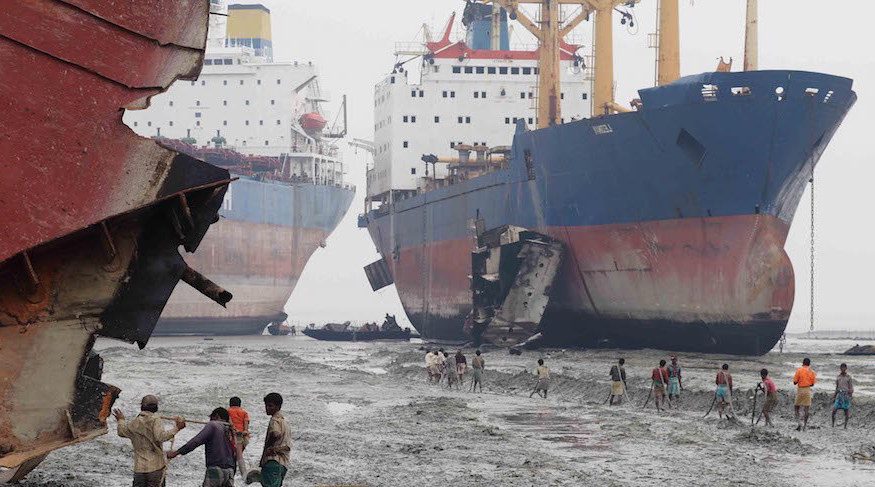Of the 206 ships dismantled worldwide up in in the first quarter of 2018, a total 152 ships ended up on beaches in South Asia, according to a quarterly report from the NGO Shipbreaking Platform.
So far this year, 10 workers have lost their lives and 2 workers have been severely injured when breaking ships in Chittagong, Bangladesh, the organization said their report. At least two workers also lost their lives due to a toxic gas leak at a shipbreaking yard in Alang, India in March, according to the report.
During the first quarter of 2018, 27 ships were also dismantled in Turkey, 7 in China, 11 in Europe and 9 in the rest of the world, the report showed.
“Ship owners continue to sell their ships to the beaching yards despite the well documented deplorable conditions. The prices offered for ships this first quarter have been high in South Asia, especially when compared to the figures of last year. Whilst a South Asian beaching yard can pay about USD 450/LDT, Turkish and Chinese yards are respectively currently paying USD 280/LDT and USD 210/LDT. This situation led to especially a significant decrease in number of vessels recycled in China, where only 7 vessels were scrapped this quarter,” the NGO Shipbreaking Platform said.
According to the NGO, South Korean and UAE ship owners sold the most ships to South Asian yards the first quarter of 2018 with 14 beached vessels each, followed by Greek and Russian owners. Shipping companies from the United States beached 5 vessels.
“South Korean Sinokor is, for now, the worst corporate dumper with seven vessels beached in South Asia in 2018. South Korean H-Line Shipping is a close runner-up, with five ships sold for dirty and dangerous scrapping on the beach. Following the ban on the import of tankers to Pakistan due to major explosions that occurred in 2016 and 2017, no tankers were sold to the Gadani yards this first quarter. However, Pakistan has re-opened to the import of tankers this week,” the organization said.
Meanwhile, only 3 ships had a European flag – Belgium, Italy and Norway – when they arrived on the beach.
“All ships sold to the beaching yards pass via the hands of scrap-dealers, also known as cash-buyers, that often re-register and re-flag the vessel on its last voyage,” the NGO Shipbreaking Platform said. “In this regard, flags of convenience, in particular those that are grey- and black-listed under the Paris MoU, are used by cash-buyers to send ships to the worst breaking locations. Almost half of the ships sold to South Asia this quarter changed flag to the grey- and black-listed registries of Comoros, Niue, Palau and St. Kitts and Nevis just weeks before hitting the beach. These flags are not typically used during the operational life of ships and offer ‘last voyage registration’ discounts. They are grey- and black-listed due to their poor implementation of international maritime law.”
According to 2017 data released by the NGO Shipbreaking Platform in February, of the 835 large ocean-going commercial ships that were sold for scrap in 2017, a total of 543 ships were intentionally run ashore and dismantled by hand at shipbreaking yards in Bangladesh, India and Pakistan, where the controversial ‘beaching’ method continues to be the predominant means of disposal for end-of-life vessels.
The 543 ships represent just over 80% of the total tonnage scrapped worldwide last year, according to the organization.

 Join The Club
Join The Club











